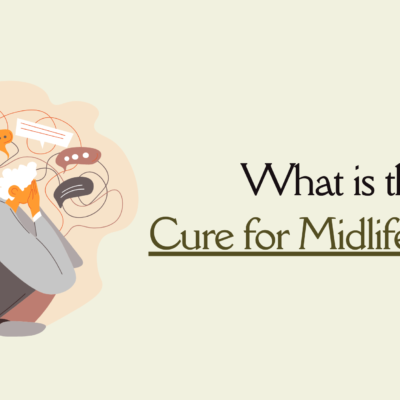Cure for Midlife Crisis: Midlife crisis is a term that creates images of flashy sports cars, sudden career changes, and existential angst. It is a sensation usually connected with a sense of disillusionment and uncertainty that can hit people as they reach their forties or fifties.
However, contrary to popular belief, a midlife crisis isn’t an unavoidable ritual of passage. Instead, it is a complex confluence of psychological, social, and biological factors that can be guided by self-awareness, strength, and bold strategies.
Also Read:
- Strategies for Healing After Emotional Abuse.
- How To Stop Negative Self Talk?
- How Do You Deal with Dissatisfaction in Life?
- Tips for Managing Emotional Triggers.
- How to Stop Being Jealous of Others Success?
In this article, we will talk about the nature of the midlife crisis, its underlying causes, and most importantly, analyze practical remedies to emerge from this transitional phase with newfound clarity and purpose.
What is a Midlife Crisis?
The midlife crisis manifests differently for each person, but common themes include feelings of stagnation, questioning life choices, and a heightened awareness of mortality. It is a period marked by a sense of urgency to reassess one’s achievements, relationships, and overall satisfaction with life.
While popular culture usually portrays a midlife crisis as a time of sudden behavior and recklessness, the reality is far more subtle. Many experience a deep sense of reflection and a passion for personal growth and fulfillment.
Causes of Midlife Crisis:
Biological Changes
Hormonal fluctuations, such as reducing testosterone levels in men and fluctuations in estrogen and progesterone in women, can affect mood and behavior, leading to elevated emotional sensitivity and mood swings.
Life Transitions
Milestones such as reaching middle age, children leaving home, or facing aging parents can activate existential questioning and a reevaluation of life preferences.
Dissatisfied Expectations
Discrepancies between one’s aspirations and reality can lead to feelings of dissatisfaction and a sense of unmet possibility, initiating a search for deeper meaning and purpose.
Social Comparisons
The pervasive influence of social media worsens feelings of inadequacy as people compare their accomplishments and lifestyles to others, leading to a deformed perception of success and happiness.
Relationship Strain
Marital dissatisfaction or divorce can pour midlife crisis, as people grapple with feelings of loneliness, regret, and a craving for romantic rejuvenation.
How to Overcome Midlife Crisis?
While a midlife crisis can be a difficult and rough period, it also presents an opportunity for deep self-discovery and modification. Here are some strategies to handle this changing period of life gracefully:
Self-Reflection
Take time to find and identify underlying sources of dissatisfaction or restlessness. Journaling, meditation, or therapy can ease this process, allowing you to gain clarity and outlook on your values, goals, and aspirations.
Accept Change
Instead of opposing change, see the midlife crisis as a motivation for growth and reinvention. Accept new experiences, hobbies, or career options that align with your passions and interests, allowing yourself to examine unknown things and expand your horizons.
Develop Gratitude
Practice gratitude regularly by recognizing and appreciating the blessings in your life, however small they may seem. Developing a mindset of gratitude promotes strength and contentment, balancing feelings of disillusionment and inadequacy.
Prioritize Self-Care
Invest in your physical, emotional, and mental well-being by adopting healthy lifestyle habits. Exercise regularly, prioritize adequate sleep, and feed yourself with nutritious foods to improve your strength and energy.
Surround Yourself with Positive People
Surround yourself with supportive friends, family members, or mentors who can give motivation, empathy, and guidance during this challenging period. Don’t hesitate to seek professional help if you are struggling to deal with overwhelming emotions.
Reconnect with Your Old Passions
Revisit past interests or hobbies that once brought you joy and fulfillment. Whether it is painting, playing an instrument, or exploring nature, reconnecting with your passions can give you a sense of purpose and creativity.
Concentrate on Relationships
Support meaningful connections with loved ones by prioritizing quality time together and engaging in open, honest communication. Promoting supportive relationships provides a feeling of belonging and emotional fulfillment, buffering against the existential loneliness usually experienced during a midlife crisis.
Set Realistic Goals
Break down bigger goals into manageable steps and celebrate small wins along the way. Setting realistic goals aligned with your values and preferences authorizes you to retrieve a sense of agency and control over your life.
At The End
A midlife crisis is a natural and usually changing phase of life characterized by introspection, uncertainty, and growth. By understanding the underlying causes and executing proactive strategies, you can handle this period with strength and emerge stronger, wiser, and more fulfilled.
Remember, a midlife crisis isn’t a sign of failure but an invitation to walk on a journey of self-discovery and renewal. Embrace the opportunity to redefine your priorities, follow your passions, and develop a deeper sense of purpose and meaning in life.








